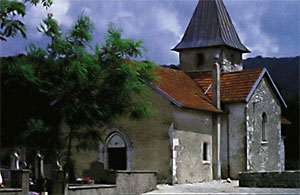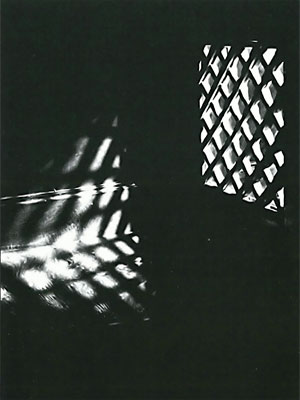The Mayet Memoirs
I recorded these notes in September, 1848. There are in my notes several similar articles.
Father Colin said: “Let us have compassion on poor sinners, let us not ask of them more enlightenment than they could be expected to have. Take a man standing at the entrance to a tunnel: light is already faint; he takes a few steps, darkness engulfs him; he walks on further, it is pitch black and he ropes in the dark. So it is with a soul which has forgotten God…. When grace seeks it out and good will responds, it is like a little glimmer of light in the depths… Do not rebuff him, receive him back into grace, ask little of him, and grace will do the rest.”
– September 1848
First mission
 The church at LaBalme – as in many parts of the Bugey – still stands as it did in the time of the Marist missioners. La Balme was the first hamlet the missioners visited. Every day Colin and Declas climbed the steep hill from Cerdon to this place, and spent the day calling the people to God.
The church at LaBalme – as in many parts of the Bugey – still stands as it did in the time of the Marist missioners. La Balme was the first hamlet the missioners visited. Every day Colin and Declas climbed the steep hill from Cerdon to this place, and spent the day calling the people to God.
Historian Gaston Lessard writes: “At La Balme, and in all the parishes where they will preach in the coming years, the first Marists are in contact with the church as it exists. It is a poor church, a hurting church, an uneducated church. They come to it with the respect, the tenderness, the care that guide a mother’s hands as she approaches the bruised body of her son.”
Experience of mercy
 The Marist missionaries spent hours each day in the confessional in the churches they visited. Often the conditions were appalling: cold and damp confessionals in a cold church in the middle of winter.
The Marist missionaries spent hours each day in the confessional in the churches they visited. Often the conditions were appalling: cold and damp confessionals in a cold church in the middle of winter.
Colin’s health was severely impaired by those times.
Yet these experiences in the confessional shaped his thinking considerably. Here, the Marists experienced the mercy of God in concrete reality, and Colin looked on those experiences as key elements in Marist life.
The hardships meant little to him. It was more important to him that a non-church going man had said to his wife after a mission sermon, “Give me some Rosary beads. Tonight I cried. Tomorrow I will go to confession”; or that someone had whispered in confession, “Father, I have waited ten years for you to come!”
The simple style of the Marists made a deep impression on the people. In several places they were initially received coolly by the people, and had to go begging for their food sometimes unsuccessfully. But by the end of the mission,the little village churches were packed, and the villagers pleaded for the missioners to stay.
The kingdom of mercy
Mayet noted several comments made by Colin on the ministry of reconciliationthrough the sacrament of Confession:
“In the Society, we shall profess all those opinions which give greatest play to the mercy of God, without of course falling into laxist theology.”
“For myself, in the confessional I follow the same approach as the Romans do. I am very fond of those principles: ‘All for souls’ and ‘Salvation before law: ”
“Rome was very useful to me on this point. It was there that I learned the maxim, ‘Law was made for man’. If I can’t save him with the Law, I shall try to save him without it.”
On January 25th, 1841 Fr Colin told us, “This is the kingdom of mercy; mercy here is boundless. Justice will take its course in the next world.”
Marist Fathers’ Constitution
Like the first missioners in Bugey they proclaim the Good News of God’s mercy to those most in need.
– Constitution 92
There is a way for Marists to be present in the Church, a way which is special to them, and which they learn from Mary. It’s best described by the words “supporting” and “upholding”. In Colin’s mind, these were the words Mary herself used to describe her place in the Church: “I supported the Church at its beginning…”
In the Bugey, the Marist missionaries were faced with an enormous contrast between the Church as they saw it: poor, broken, abandoned, confused; and the Church as it could be, and as Jesus wished it to be: a Church which would be “united in mind and heart”, a Church into which all would be gathered and where all would find a welcome.
For those missionaries, the key to keeping a balance between these two realities lay in the personality of Mary, and in what they understood as”the work of Mary”.
Doing the work of Mary would mean looking at the Church as she would; it would mean looking on the Church with the heart of a mother. To look on the Church with the heart of a mother is to accept it as it is, in all its brokenness and inadequacy, and yet to keep one’s eyes fixed on what it is called to be.
To look on the Church with the heart of a mother is to develop a special care for anyone who is on the margins and struggling to believe or belong. A mother cannot bear even one of her children to be left out; she will be on the look-out for the one who is falling behind, or missing out, or neglected.
It was this experience of maternal tenderness towards the sinner that Colin picked up in a special way during those missions. Many of the people in the villages they visited had been away from the Church and the Sacraments for years, following the events of the Revolution.
Colin had described his six years as a curate in the presbytery of Cerdon as years of great consolation and sweetness, during which, he said, he had learned to “taste God”.
But to meet the God who is tenderness and compassion, and to “taste God” in prayer, is to develop a taste for those whom the compassionate God cares about in a special way – the weak, the lost, the outcast, the sinner.
The experience of the Bugey missions gave Colin and his followers a sense of urgency about gathering people who were on the margins of the Church.
Twenty years later, this experience was still with him. He said, “It seems to me that in an age of unbelief such as our own, the minister of souls must burn with the desire to fly to the salvation of his brothers, and be as it were impatient for the moment when he can race to their aid.”